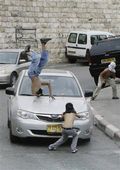 For a more professional assessment of the photos of Silwan stone-throwers being run over by an Israeli car, I talked to veteran photographer and imagery advisor David Katz. He offers four reasons why the incident reeks of a set up.
For a more professional assessment of the photos of Silwan stone-throwers being run over by an Israeli car, I talked to veteran photographer and imagery advisor David Katz. He offers four reasons why the incident reeks of a set up.
(The video Katz refers to is here.)
1. The Location
Silwan's isn't really the most tense place. Photographers waiting for stone-thowings would be more likely to go to places like Bilin or Hebron. You wouldn't hang around Silwan unless you knew ahead of time that something was going to happen.
Also, the only photographers who can safely work in Silwan are the ones who are already known to the locals. Newcomers wouldn't be allowed to operate, and would be in physical danger. I've seen it.
2. The Photographers' Positions
When photographers are getting ready for something, but they're not sure how it's going to play out, they tend to position themselves close together. Here, the photographers are more spread out at different sides of the action. It seems everyone wanted to get their own unique position.
Israel has security cameras around Silwan, so there may be CCTV footage of what happened before, during, and after the stone-throwing. If there is, there are a few things I'd watch for. At what point did the photographers position themselves? The other cars parked there: were they deliberately put there? At what point was the back window hit? If other cars were allowed to safely pass before the stone throwing, it would shed light on whether they were targeting the driver [the driver, David Be'eri, is the director of Elad, which advocates for Jewish families living in eastern Jerusalem], or whether they just happened to get him.
If the stone throwing were really spontaneous, the kids should've been throwing from above. It's safer for them, and they can do as much damage, if not more. But that's less photogenic.
3. Reactions to the Hit and Run
When a car's coming at you, and hits a kid, your first thought is your personal safety and what's happening to the boy. But when you watch the video, nobody looks scared, nobody screams in horror. The children just continue throwing stones and the photographers keep snapping photos.
I have to wonder what the photographers were expecting. What would they have done if the car had stopped? Everyone there knows that when a car is stoned, the driver's in greater danger if he just stops. Is that what the photographers thought would happen?
As human beings, the photographers should've warned the police. But today's Mideast photographers are a different breed. Because of the nature of the business — it's a cash cow — why spoil a good picture?
4. The Dynamics of Staged Stone-Throwing Incidents
Adults, perhaps one of the local elders, will tell the kids to throw stones. Another adult who has connections and friends with photographers will tip them off.
It's absolute collusion. Why? It's either for money, for politics, or both. The news agencies want these images because they sell, and they fit in with their worldview. Photographers know these kinds of images will move. Most importantly, if there had been no photographers present, there would have been no incident.
Related Reading: Border Clash: A Case Study in Reuters Photography

